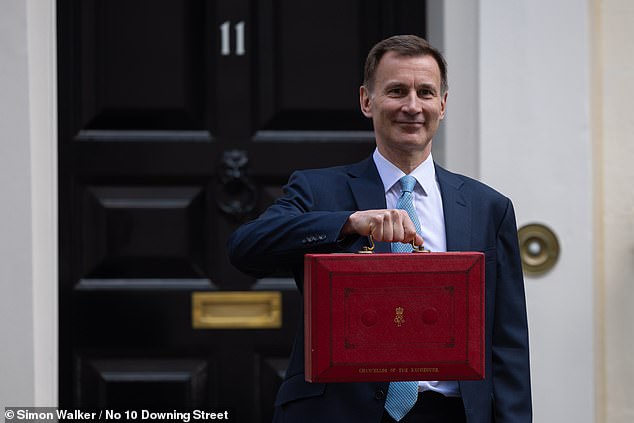
Michael Taylor, pictured with his wife Nora, says he welcomes the new British Isa
A new British Isa will allow investors to pour an extra £5,000 into the stock market each year, the Chancellor announced yesterday.
Jeremy Hunt introduced two new British savings accounts in a bid to encourage investment in UK companies and boost the City – a British Isa, run by stockbrokers, and new British Savings Bonds, run by National Savings & Investments (NS&I).
The British Individual Savings Account will allow stocks and shares investors to deposit an extra £5,000 beyond the existing £20,000 annual Isa allowance – so long as it is only used to invest in UK-listed companies.
It will apply to those who have already maxed out their £20,000 yearly allowance into the tax-efficient accounts.
> What you need to know about the new British Isa
As an investor, I’m backing the British Isa
Michael Taylor, 33, thinks the introduction of a British Isa is a great idea and will help this country’s companies.
Referring to previously mooted plans, he said: ‘What they were talking about before was just setting aside a proportion of the £20,000 allowance of existing Isas for British stocks.
‘Now, they have created a whole new Isa, with an additional £5,000 allowance if you only invest in British stocks, which makes more sense.’
However, he pointed out that the change will only really impact the wealthy, who have £20,000 saved already.
Mr Taylor and wife Nora, pictured, live with their 11-month-old between London and Hartlepool, where his parents are. He is a self-employed stock trader.
After taxes, their annual earnings are in six figures. Mr Taylor doesn’t think the Budget had much of an effect on him. He was hoping to see a lowering of VAT because it heavily impacts his business, which makes more than £85,000 in revenue.

The Great British Investor: Mr Hunt said he had received calls from the City to encourage more people to invest in UK assets
Extra £5,000 to invest tax-free raises questions
Mr Hunt said he had received calls from more than 200 City representatives to reform the Isa system and encourage more people to invest in UK assets.
The heavily UK-focussed FTSE 250 rose by 1.24 per cent by 3pm yesterday on the news.
Jason Hollands, of Isa provider Bestinvest, said: ‘The British Isa is undoubtedly a victory for the City stockbrokers and bankers who have lobbied hard for it amid a drought in newly-listed companies and a worrying sapping of companies listed in London to New York.’
However, experts at stockbrokers have warned that the measures will further complicate an already-complex system and will only advantage the wealthiest savers.
Just 900,000 savers made the maximum annual contribution of £20,000 into a stocks and shares Isa, according to official figures from HM Revenue & Customs.
Michael Summersgill, chief executive at AJ Bell, said the British Isa was ‘doomed to fail in its objectives to kickstart growth’ and will apply only to a ‘tiny minority’.
For most people, the British Isa only adds an unwelcome complexity
Michael Summersgill, AJ Bell
He said: ‘Fifty per cent of the money our customers currently invest through their stocks and shares Isas is invested into UK assets, so this new allowance will have no impact whatsoever on their investment behaviour.
‘For most people, the British Isa only adds an unwelcome complexity.’
Rachael Griffin, tax and financial planning expert at Quilter, said: ‘While the British Isa is presented as a strategic move to bolster the UK stock market and economy, it is fraught with potential pitfalls and may not address the root causes of the challenges facing the UK’s financial sector.
‘The measure is likely a politically-motivated stunt ahead of upcoming elections, rather than a well-considered strategy aimed at sustainable economic growth.’
Investors who place too large a share of their money in British stocks risk giving up better returns in global stocks.
Over the past five years, the FTSE All Share, which tracks listed UK companies, has returned 7.67 per cent, while a fund that tracks the global market has gained 13.03 per cent over the same period.
NS&I will launch new British Savings Bonds early next month, which will guarantee savers a fixed rate of interest for three years on investments between £500 and £1 million. The bonds will replace NS&I’s Guaranteed Growth Bonds and Guaranteed Income Bonds, which were last on sale in 2019.
The three-year rate of interest will be announced next month in line with the market, and investors will be able to open an account online. There will be support for customers who are unable to connect online.
Any money invested in the Treasury-backed bank is secure and invested into supporting the UK.
Some links in this article may be affiliate links. If you click on them we may earn a small commission. That helps us fund This Is Money, and keep it free to use. We do not write articles to promote products. We do not allow any commercial relationship to affect our editorial independence.




